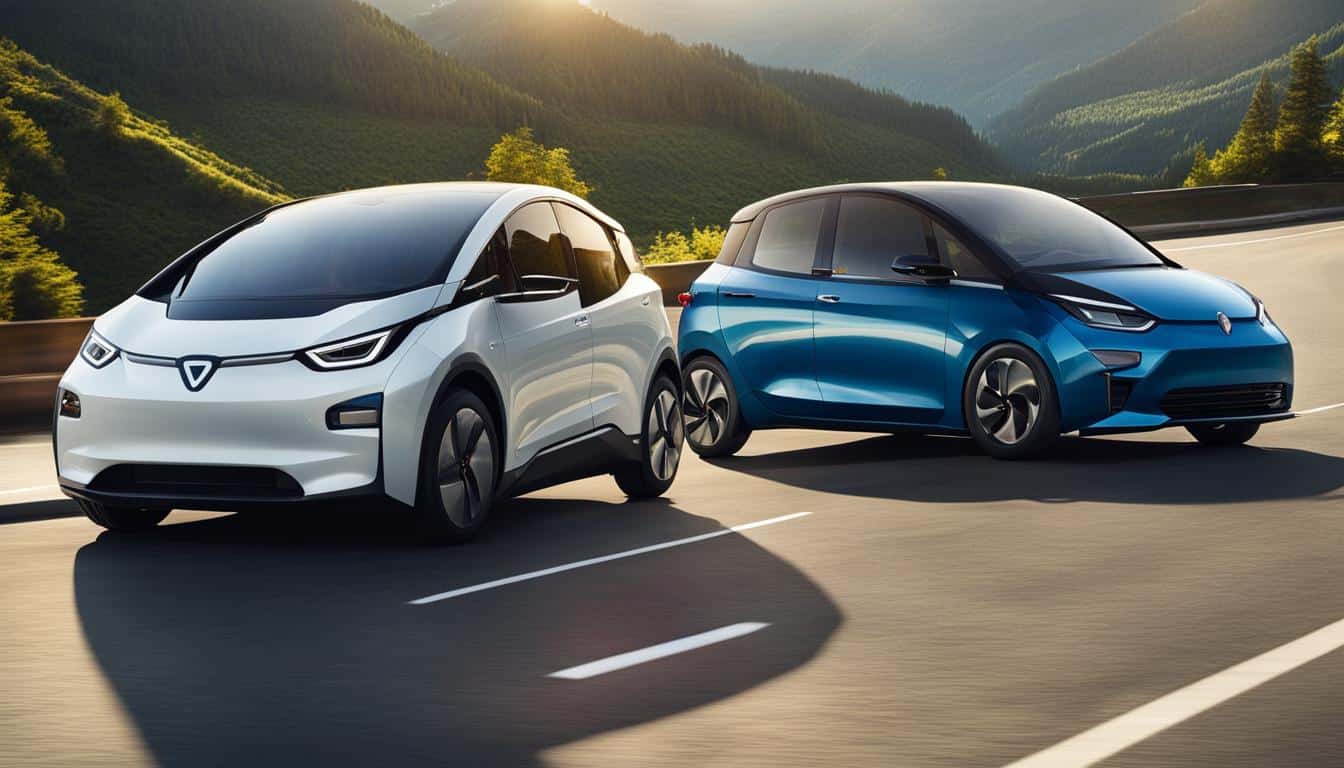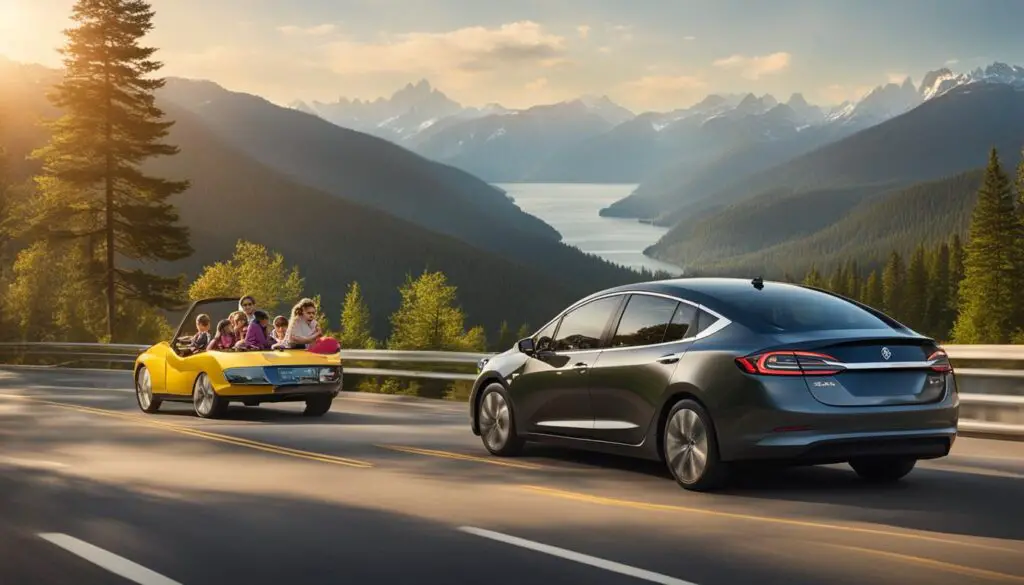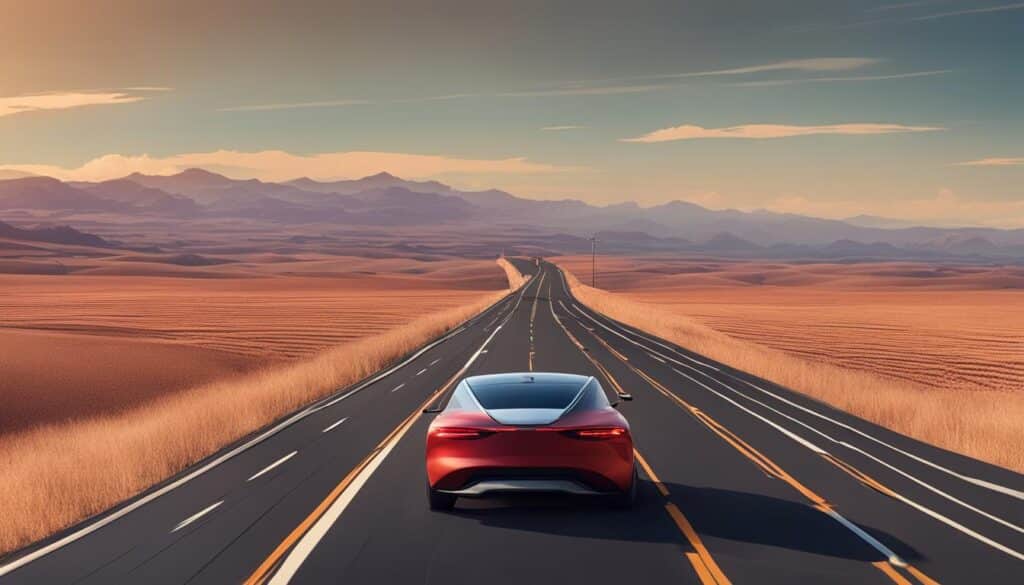
Road Trip Readiness: Comparing EVs and Gasoline Cars for Long Journeys
When it comes to planning a long journey, road trip readiness is a crucial factor to consider. As electric vehicles (EVs) gain popularity, many people wonder how they compare to traditional gasoline cars in terms of long-distance travel. To provide some clarity on this matter, I conducted a comparison between three popular models: the Tesla Model S Plaid, the Ford Mustang Mach-E, and the Audi Q5.
The experiment focused on two key aspects: the time taken to reach the destination and the cost of fuel or electricity consumed during the trip. The Audi Q5, powered by gasoline, turned out to be the fastest among the three. It was closely followed by the Tesla Model S Plaid, an electric vehicle, and then the Ford Mustang Mach-E, which also runs on electricity. Interestingly, while the Audi consumed traditional fuel, both the Tesla and the Ford were fueled by electricity. This difference in energy sources led to variations in fuel costs, with the Audi requiring more expensive gasoline compared to the more cost-efficient electricity used by the Tesla and Ford.
Key Takeaways:
- Comparing EVs and traditional gasoline cars is essential when planning a long journey.
- The experiment showed that the Audi Q5 was the fastest, followed by the Tesla Model S Plaid and the Ford Mustang Mach-E.
- The fuel or electricity used during the trip significantly influences the cost of the journey.
Benefits of Electric Vehicles for Long-Distance Travel
Electric vehicles (EVs) offer a range of benefits that make them an ideal choice for long-distance travel.
One of the key advantages of EVs is their cost-efficiency. By using electricity instead of gasoline, EV owners can save significantly on fuel costs. The cost of electricity is generally lower compared to gasoline, resulting in long-term savings for frequent travelers.
Another benefit of electric vehicles is their low maintenance requirements. EVs have fewer moving parts compared to traditional gasoline cars, reducing the need for regular maintenance and repair. This not only saves money but also ensures a longer lifespan for the vehicle. With fewer mechanical components to worry about, EV owners can enjoy peace of mind during their long journeys.
Environmental friendliness is another major advantage of electric vehicles. Unlike gasoline cars, EVs produce no tailpipe emissions, helping to reduce air pollution and combat climate change. By opting for an electric vehicle, travelers can contribute to a cleaner and healthier environment for future generations.
In addition to their environmental benefits, EVs are known for their smooth ride and impressive performance. Electric motors provide instant torque, delivering quick acceleration and seamless power delivery. Some electric vehicle models are capable of reaching high speeds, ensuring a thrilling and enjoyable driving experience on long-distance trips.
Key Benefits of Electric Vehicles:
- Cost-efficiency: Savings on fuel costs
- Low maintenance: Fewer mechanical components
- Environmental friendliness: No tailpipe emissions
- Smooth ride and impressive performance
Electric vehicles offer a compelling choice for long-distance travel, combining cost savings, environmental consciousness, and thrilling performance. As the charging infrastructure continues to expand, the future looks bright for electric vehicles as reliable and efficient companions on road trips.
Considerations for Long-Distance Travel in Electric Vehicles
Before embarking on a long-distance journey in an electric vehicle, there are a few considerations to keep in mind. To ensure a comfortable and uninterrupted journey, it’s important to plan ahead and account for the unique characteristics of electric vehicles.
Range Planning
One of the primary considerations for long-distance travel in electric vehicles is the range. Electric vehicles have varying ranges, depending on the model and battery capacity. It’s crucial to plan the journey carefully, taking into account the distance to be covered and available charging stations along the route.
Charging Infrastructure
The availability of charging infrastructure is another crucial factor to consider. Research and identify charging stations along the planned route to ensure convenient access to charging facilities. Different types of chargers have varying charging times, so it’s essential to familiarize yourself with the charging options and their respective charging speeds.
Choosing a Reliable Model
When considering a long-distance journey in an electric vehicle, it’s essential to choose a reliable model. Conduct thorough research on different electric vehicle models, including their performance, reliability, and battery efficiency. This will help minimize the risk of running into reliability issues during your trip.
| Considerations for Long-Distance Travel in Electric Vehicles | |
|---|---|
| Consideration | Explanation |
| Range Planning | Factor in the vehicle’s range and identify charging stations along the route. |
| Charging Infrastructure | Research and locate available charging stations to ensure convenient access. |
| Choosing a Reliable Model | Thoroughly research and select an electric vehicle model with a reliable track record. |
In the words of Thomas Edison, “I’d put my money on the sun and solar energy. What a source of power! I hope we don’t have to wait until oil and coal run out before we tackle that.”
With these considerations in mind, long-distance travel in electric vehicles can be a rewarding and sustainable experience. By carefully planning the journey, accounting for charging infrastructure, and selecting a reliable electric vehicle model, drivers can confidently embark on their adventures while contributing to a greener future.

Range Anxiety and Electric Vehicle Travel
Range anxiety is a common concern among electric vehicle (EV) owners, referring to the fear of running out of battery power while driving. However, as EV technology continues to advance and charging infrastructure improves, range anxiety is becoming less prevalent.
New electric vehicle models are being introduced with longer ranges, comparable to those of gasoline-powered cars. This means that EV drivers can now travel similar distances without the worry of running out of power.
For example, the Tesla Model S Plaid, one of the most popular electric vehicles on the market, has an impressive range of over 390 miles on a single charge.
Additionally, charging stations are becoming more widespread, making it easier for EV owners to find charging options during long-distance trips. With the growing network of charging stations, drivers have more confidence in their ability to recharge their vehicles when needed.
According to a recent study by the National Renewable Energy Laboratory (NREL), there are over 107,000 public charging stations in the United States.
Electric vehicles offer several environmental and cost benefits for long-distance travel. They produce zero tailpipe emissions, reducing greenhouse gas emissions and contributing to cleaner air. Moreover, by using electricity instead of gasoline, EV owners can potentially save on fuel costs in the long run.
| Electric Vehicles | Gasoline Cars | |
|---|---|---|
| Environmental Impact | Zero tailpipe emissions | Greenhouse gas emissions |
| Cost of Fuel | Electricity costs | Gasoline costs |
| Charging Times | Vary depending on charger type | Refueling time |
| Maintenance | Fewer moving parts, lower maintenance costs | Regular maintenance required |
With the combination of longer EV ranges, an expanding charging network, and the environmental and cost benefits, range anxiety is becoming a thing of the past for electric vehicle travelers.

The Future of Electric Vehicle Travel
The future of electric cars and long-distance travel looks promising. As technology continues to improve, we can expect even longer EV ranges and faster charging times. Governments and organizations are also investing in the development of charging infrastructure, ensuring a smoother and more convenient charging experience for EV owners.
As range anxiety becomes less of a concern, more people are likely to consider electric vehicles as a viable option for their long-distance travel needs. With the numerous benefits offered by EVs, including sustainability and cost savings, electric cars are positioning themselves as the future of long-distance travel.
The Future of Electric Cars and Long-Distance Driving
The future of electric cars and long-distance driving looks bright, with advancements in technology and infrastructure paving the way for a sustainable and convenient mode of transportation. As the world shifts towards cleaner and more efficient energy alternatives, electric cars are playing a significant role in reducing carbon emissions and creating a greener future.
One of the key factors driving the growth of electric cars is the expansion of charging infrastructure. As more charging stations are installed across the country, it becomes easier for electric car owners to embark on long-distance journeys without the fear of running out of power. The accessibility of charging points along popular routes makes electric cars a practical choice for individuals who frequently travel long distances.
Moreover, car manufacturers are continuously developing electric vehicle models with longer range capabilities. These advancements allow electric cars to travel comparable distances to their gasoline-powered counterparts, eliminating the concern of range anxiety. With improved battery technology and increased efficiency, electric cars are becoming more reliable for long-distance driving.
The demand for electric cars is also driven by government initiatives aimed at reducing carbon emissions and promoting sustainable transportation. Many countries have implemented policies and incentives to encourage the adoption of electric vehicles, such as tax credits, rebates, and preferential parking. These measures make electric cars more accessible and affordable, driving consumer interest and increasing the market share of electric vehicles.
Furthermore, the environmental and cost benefits of electric cars make them an attractive option for long-distance travel. Electric cars produce zero tailpipe emissions, resulting in cleaner air and a reduced carbon footprint. Additionally, the cost of electricity for charging an electric car is typically lower than the cost of gasoline, allowing drivers to save money on fuel expenses during long journeys.
The Growing Electric Vehicle Market
The growing market for electric cars reflects the increasing interest and adoption of these vehicles for long-distance travel. According to a report by BloombergNEF, global electric vehicle sales are expected to reach 10 million units by 2025 and surpass 25 million by 2030. This projected growth is driven by advancements in technology, expanding charging infrastructure, and the decreasing cost of electric vehicle production.
| Year | Electric Vehicle Sales (Millions) |
|---|---|
| 2015 | 0.5 |
| 2020 | 2.8 |
| 2025 (Projected) | 10 |
| 2030 (Projected) | 25 |
The table above illustrates the projected growth of electric vehicle sales in the coming years. As technology continues to evolve and charging infrastructure expands, electric cars will become a common sight on highways, providing a viable option for long-distance travel.
“The future of long-distance driving lies in electric cars. With advancements in technology and infrastructure, driving an electric car for hundreds of miles will become a seamless experience.”
In conclusion, the future of electric cars and long-distance driving is promising. The expansion of charging infrastructure, the development of electric vehicle models with longer ranges, and the growing demand for sustainable transportation options are driving the adoption of electric cars. As the charging infrastructure continues to improve and range anxiety becomes less of a concern, electric cars will become an increasingly attractive choice for individuals embarking on long-distance journeys.
Electric Cars for Long-Distance Travel: Breaking the Myth
The myth that electric cars are not suitable for long-distance travel is being debunked. With advancements in EV technology and an expanding charging infrastructure, electric cars are becoming a practical option for long journeys.
New models are offering longer ranges, making it possible to travel comparable distances to gasoline-powered cars. The environmental benefits and cost savings of driving electric cars make them an attractive choice for long-distance travel.
As the charging infrastructure continues to grow, range anxiety will become less of a concern.
Electric cars are equipped with advanced battery technology that allows for increased range. Manufacturers like Tesla, Nissan, and Chevrolet have introduced models with ranges exceeding 300 miles on a single charge. These longer ranges provide drivers with the confidence to embark on long journeys without the fear of running out of battery power.
The Benefits of Electric Cars for Long-Distance Travel:
- Lower fuel costs: Electric cars rely on electricity instead of gasoline, resulting in significant savings on fuel expenses for long trips.
- Environmental friendliness: Electric cars produce zero tailpipe emissions, reducing the carbon footprint during long-distance travel and contributing to a cleaner environment.
- Smooth acceleration: Electric motors provide instant torque, delivering quick acceleration and a smooth ride during long drives.
- Reduced noise pollution: Electric cars operate quietly, providing a serene driving experience for passengers during lengthy journeys.
“Electric cars have come a long way in terms of range capabilities. Modern EVs are more than capable of taking you on road trips, and they offer the added benefits of lower fuel costs and environmental sustainability.” – John Davis, EV Enthusiast
Conclusion
In conclusion, when comparing EVs and traditional gasoline cars for long journeys, it is evident that electric vehicles have their advantages and considerations. Electric vehicles offer cost-efficiency, as they use electricity instead of gasoline, resulting in potential savings on fuel costs. Furthermore, EVs provide environmental benefits by producing no tailpipe emissions, contributing to a cleaner and greener future. In terms of performance, electric vehicles have shown impressive results, with some models capable of reaching high speeds.
However, it is essential to consider the range limitations and charging infrastructure when planning a long-distance trip in an electric vehicle. The range of EVs varies, and it is crucial to plan the journey and factor in charging stops. Charging times can also vary depending on the type of charger used. Additionally, researching and choosing a reliable electric vehicle model is crucial to ensure a comfortable and uninterrupted journey.
With the ongoing advancements in EV technology and the expansion of charging infrastructure, electric cars are becoming a viable option for road trips. The future looks promising, with longer-range capabilities being introduced and the increasing demand for sustainable transportation options. As the charging infrastructure continues to improve, range anxiety will become less of a concern, making electric cars a more attractive choice for long-distance travel. It is important for individuals to assess their specific needs and preferences when deciding whether to choose an EV or a traditional gasoline car for their road trip.
FAQ
What are the benefits of electric vehicles for long-distance travel?
Electric vehicles offer cost-efficiency, environmental benefits, and impressive performance. They use electricity instead of gasoline, leading to savings on fuel costs. They have fewer moving parts and require less maintenance, resulting in lower maintenance costs and a longer lifespan. Electric vehicles produce no tailpipe emissions, making them environmentally friendly. They provide a smooth ride and impressive performance, with some models capable of reaching high speeds.
What considerations should I keep in mind for long-distance travel in an electric vehicle?
When planning a long-distance journey in an electric vehicle, it’s important to consider the range of the vehicle, plan the journey accordingly, and factor in charging stops. Charging times may vary depending on the type of charger used. Researching and choosing a reliable electric vehicle model is crucial to avoid any reliability issues. It’s also important to take into account the charging infrastructure available along the planned route to ensure a comfortable and uninterrupted journey.
What is range anxiety and how is it being addressed for electric vehicle travel?
Range anxiety refers to the fear of running out of battery power while driving an electric vehicle. However, as electric vehicle technology advances and the charging infrastructure improves, range anxiety is becoming less prevalent. New electric vehicle models are being introduced with longer ranges, comparable to those of gasoline-powered cars. Charging stations are also becoming more widespread, making it easier to find charging options during long-distance trips.
What does the future hold for electric cars and long-distance driving?
The future of electric cars and long-distance driving looks promising. The charging infrastructure is expanding, and more electric vehicle models are being introduced with longer range capabilities. The increasing demand for sustainable transportation options and government initiatives to reduce emissions are driving the growth of electric vehicles. As the charging infrastructure continues to improve, range anxiety will become even less of a concern.
Is it true that electric cars are not suitable for long-distance travel?
The myth that electric cars are not suitable for long-distance travel is being debunked. With advancements in EV technology and an expanding charging infrastructure, electric cars are becoming a practical option for long journeys. New models are offering longer ranges, making it possible to travel comparable distances to gasoline-powered cars. The environmental benefits and cost savings of driving electric cars make them an attractive choice for long-distance travel. As the charging infrastructure continues to grow, range anxiety will become less of a concern.
